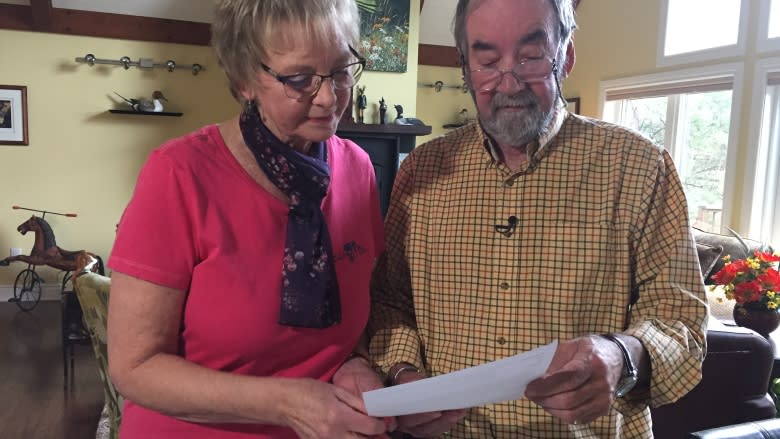Time is running out for Joan Morgan, 96, to get permanent resident status
Ian Samuel is angry, frustrated and demanding answers why it's taking so long to get his ailing 96-year-old mother-in-law permanent resident status — a process he and his wife started 16 months ago.
Speaking to CBC Toronto in their Picton home, roughly 160 kilometres east of Toronto, Samuel says he's supportive of Canada's refugee policy but says any foreigners wanting to live here are left without answers, "unless you're a Syrian migrant."
Pointing at this journalist, Samuel leans in and says emphatically: "Leave that in."
He definitely wants an audience to hear it.
"It's all nonsense," he said. He explained that he and his wife Janice haven't been able to get an update on their sponsorship application for Joan Morgan, Janice's mother and a British citizen. Contacting CBC Toronto, he and his wife said, was a last resort as Morgan might have to go back home to England later this year.
Government form letters
"The bottom line is nobody is doing anything. They don't seem to care," he said, after sending written requests to the federal and provincial governments and getting form letters in return.
Morgan came to Canada from Birmingham, England, in May 2015. The Samuels applied for a parent and grandparent super visa to allow her to stay for two years. Then they applied for permanent resident status for her in January 2016.
Now, the super visa is about to run out, meaning Morgan, who is in failing health, will soon have to go home. But the Samuels say they still have no idea what's happening.
Janice Samuel said her mother was recently diagnosed with congestive heart failure, has crippling arthritis in her hip, back and feet and "can hardly walk without almost collapsing." Her short-term memory is also declining.
One form letter from John McCallum, the former minister of Immigration, Refugees and Citizenship, stated the government only considers expediting "extraordinary cases with compelling circumstances." That was dated August 2016.
"For God sake, she's going to be 97. That's not an urgent case?" Ian Samuel asked.
The Samuels said they found a private respite home — a temporary facility that offers special care for seniors — not far from where they live. Morgan moved in there September 2015. They loved that she was with peers participating in age-appropriate activities, and they hired personal support workers to help with bathing and dressing.
Nursing care
As her mobility diminished, Morgan couldn't remain in the home, which was based on independent living, and had to leave last month.
She moved in with the Samuels as Janice Samuel looked for a nursing home that could care for her 24 hours a day, seven days a week.
"I didn't realize you had to have an OHIP card to get in," she said.
It's mandatory for Ontario nursing homes and the sticking point is that Morgan can't get an Ontario health insurance plan without a permanent resident card.
A letter from Premier Kathleen Wynne's office in August 2016, stated that only a Canadian citizen, permanent resident or "one of the newcomer-to-Canada groups" are eligible for OHIP.
Morgan's health continues to deteriorate and the Samuels — both in their 70s — continue caring for her in their home.
Joan Morgan explained her daughter does everything for her from morning to night — preparing meals, administering medication, helping with toileting, dressing, bathing and walking.
As her mother's needs increase, Samuel worried about her ability to provide in-house care — especially as she has her own health concerns, having had a double hip replacement and issues with her back.
"Not only is it my duty, I want to support her now that she's in the situation that she is," Janice Samuel explained.
"That's the only thing that's right," her husband said. "It's the right thing to do."
Editor's note: As a result of CBC Toronto's inquiries, the federal department of citizenship and immigration, as well as the province's ministry of health are looking into Morgan's file.



